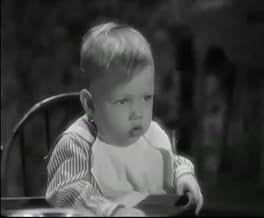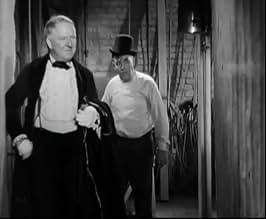Aggiungi una trama nella tua linguaThe Great McGonigle and his troupe of third-rate vaudevillians manage to stay one step ahead of the bill collectors and the sheriff.The Great McGonigle and his troupe of third-rate vaudevillians manage to stay one step ahead of the bill collectors and the sheriff.The Great McGonigle and his troupe of third-rate vaudevillians manage to stay one step ahead of the bill collectors and the sheriff.
- Regia
- Sceneggiatura
- Star
- Premi
- 2 vittorie totali
- Girl in Audience
- (non citato nei titoli originali)
- Mr. Livingston
- (non citato nei titoli originali)
Recensioni in evidenza
Normally Fields character dominates his comedy, like Laurel and Hardy's personaes dominate their films, or like the Marx Brothers dominate theirs. But here the story line manages to blend everything better than in most of Fields films. Compare it with POPPY, where Fields (as Eustace McGargle) has to balance two story lines: his attempts to pass off his beloved adopted daughter Poppy as a missing heiress, and his attempt to hoodwink the yokels at a local fair. It would not be too hard to split that film into two movies. But here the story deals with the tribulations of a down-at-the-heels stage manager trying to hold his troop together, despite declining revenues. Actually, although it is a funny movie, THE OLD FASHIONED WAY is a study of tragic frustration. For, in the end, despite all his partial victories, McGonigal can't save his troop. He does put on the play THE DRUNKARD, but he fails to maintain the plays' "angel" Cleopatra Pepperday (Jan Dugan) as backer - he fails miserably in this, probably because he can't bring himself to put her into even one small scene as she is so bereft of talent. She is led to believe that her key line is "Here comes the Prince!", and is seen practicing it before the eyes of her friend the sheriff, who can't believe she is going to be on stage. She never does appear on stage, and is last seen crying with the sheriff trying to comfort her. McGonigal realizes he can't pay his troops salaries, nor the cost of their lodgings. And his daughter is going to leave him to marry the man she loves. Look at his face as he embraces her for what he knows is the last time. Who says Fields couldn't act? He is last seen selling some nostrum to the public, pretending to be hoarse until he drinks it. Only the faithful Tammany Young, as his shill, remains from his days of glory.
It's a real downer ending, but the comedy is superb. The scene of the trapped Fields forced to hear Dugan singing "the Sea Shell Song" is a triumph, and it is frequently forgotten that when McGonigal's daughter's boyfriend offers to audition, he says he knows the "Sea Shell Song" , almost causing Fields to have a stroke! Fields run-ins with Baby LeRoy (who even spoils his juggling routine) are a panic. It is a great little film, and one wishes it were shown more often.
Curiously enough the play THE DRUNKARD (written in the 1840s) was a leading melodrama of the 19th Century, and it would be brought back to the screen by another comic legend a few years later. Buster Keaton, as young Willum, confronted Alan Mowbray (as Lawyer Cribbs) in THE VILLAIN STILL PURSUES HER. That film too is rarely revived on television, and it would be interesting to see it and THE OLD FASHIONED WAY to compare versions of THE DRUNKARD. It is a hokey play by our standards, but in the 1840s, when temperance was such a major topic, it was very important. Still, one can't get out of one's mind the comment of a forgotten supporting bit player in THE OLD FASHIONED WAY. He's a young man, with his girlfriend, watching this play because it is the only entertainment in this one horse town. He looks somewhat more sophisticated than she does...she just looks star struck. He's observing her. "Oh, isn't it wonderful!", she gushes. "You think this is a good play?", he asks (emphasizing "this"). "Oh yes!", she responds. Well what can one say to that kind of reaction - probably quite a common one in the boondock areas of the United States in 1880 or so.
The film, as such, relies more on atmosphere than the typical Fields 'sketches' and this, perhaps, lends it a charm - and a freshness - that it wouldn't otherwise possess. Among its many notable scenes are: Fields thinking the military reception waiting at the train station is for his troupe's benefit; the dinner sequence with a rampaging, famished troupe and Fields' hilarious encounter with Baby LeRoy (who throws food at him and drops his watch into a jar of molasses) - Fields manages to get even with the child by kicking him when no one's watching!; the rich old lady's cringe-inducing singing audition, with the star reacting accordingly (he's hoping to secure her financial backing for the play the troupe will be presenting in town by promising her a role in it - this is eventually whittled down to a single line, which she's never even called upon to deliver!); Fields falling off the stage during rehearsals, etc.
"The Drunkard" set-piece occupies a good deal of the second half: a hoary melodrama which the troupe performs with gusto - with Fields as the mustachioed and hissable villain of the piece who, at one point, reprises the immortal line from his short THE FATAL GLASS OF BEER (1933) "'T ain't a fit night out for man nor beast". With the closing of each act, the curtain comes crashing down making a loud thumping sound; still, the film is clearly intended as a valentine to the days of vaudeville - and even includes a wonderful juggling routine towards the end that showcases Fields' amazing dexterity (in spite of his advancing age, corpulent physique and propensity for booze).
The final sequence finds The Great McGonigle keeping busy as a medicine showman - having left his daughter behind, so as not to interfere with her happiness alongside a stage-struck boy emanating from a respectable family. Typically, for comedies from this era, romance and songs have been incorporated into the narrative as much as a device by which to counterbalance the star's antics as for purely commercial reasons (since these films were largely intended for family consumption).
Lo sapevi?
- QuizW.C. Fields recreates his famous vaudeville juggling routine with the cigar boxes.
- BlooperBetty is described as the leading lady of the troupe--as one would expect, since she is The Great McGonigle's daughter. But she takes no part in the show; another actress plays the female lead.
- Citazioni
Dick Bronson: Mr. McGonigle, I've got to have some money.
The Great McGonigle: Yes, my lad, how much?
Dick Bronson: Two dollars.
The Great McGonigle: If I had two dollars, I'd start a number two company.
Dick Bronson: For two cents I'd quit.
The Great McGonigle: [to Marmaduke] Pay him off!
[Marmaduke gives him a two cent stamp]
- Curiosità sui creditiThe end credits are in 2 parts; the first contain the actors and their character names in the film as a whole; The second contains the actors and their character names in the play, "The Drunkard." Five actors, therefore, are credited twice: W.C. Fields, Joe Morrison, Judith Allen, Samuel Ethridge and Ruth Marion.
- ConnessioniFeatured in Hollywood: The Gift of Laughter (1982)
- Colonne sonoreWe're Just Poor Folks Rolling in Love
(1934) (uncredited)
Lyrics by Mack Gordon
Music by Harry Revel
Sung by Joe Morrison
I più visti
Dettagli
- Data di uscita
- Paese di origine
- Lingua
- Celebre anche come
- The Old Fashioned Way
- Luoghi delle riprese
- Azienda produttrice
- Vedi altri crediti dell’azienda su IMDbPro
- Tempo di esecuzione1 ora 11 minuti
- Colore
- Proporzioni
- 1.37 : 1
Contribuisci a questa pagina































